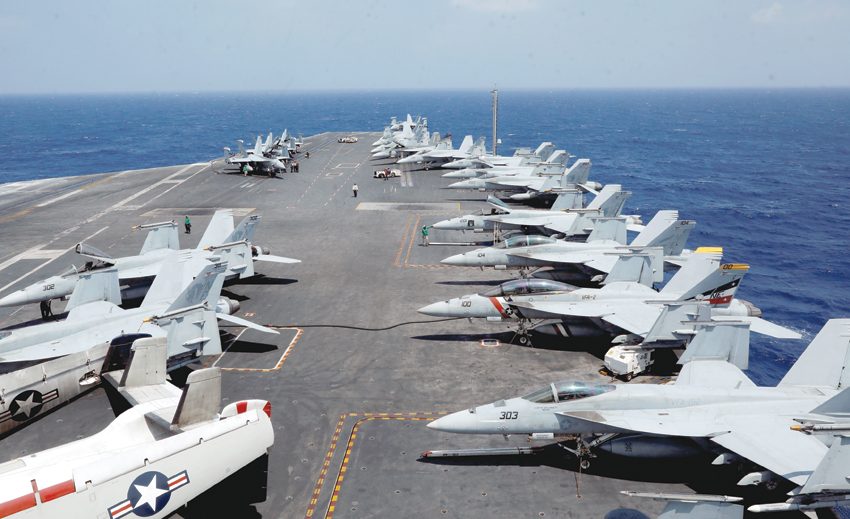

SEOUL: South Korean companies on Friday bore the brunt of Chinese anger over the deployment of a US missile defence system outside Seoul, as shares tumbled after media reports of Beijing tour operators being ordered to stop selling trips to the country.
Cosmetics makers, retailers, automakers and airlines were among the biggest losers as South Korea’s main benchmark index fell 1.1 per cent in afternoon trade, weighed down by fears that China may choke off a key source of tourist dollars.
Cosmetics firm Amorepacific ended down 12.7 per cent at its lowest price in more than two years, while duty free retailer Hotel Shilla tumbled 13 per cent. South Korea is the world’s biggest duty free market.
Hyundai Motor finished down 4.4 per cent after photos of a vandalised Hyundai car circulated on Chinese social media.
South Korea’s foreign ministry said in a statement it was checking the media reports on a Chinese ban to sell travel programmes.
“If such reports are true, it would be an unfair action... and very regrettable,” the ministry said.
An official at South Korea’s culture ministry said it heard from some Korean tour operators that they were told by Chinese peers about the sales ban.
Attempts to book Korean tours on several of the biggest operators in China produced mixed results. Two companies, Ctrip and Qunar, were prepared to accept a booking but Tuniu declined citing the THAAD issue. Tuniu’s spokesperson did not immediately respond to comment.
China’s Foreign Ministry spokesman Geng Shuang said he had not heard about the situation.
While Chinese state media have called for people to shun South Korean goods, an editorial in influential state-run tabloid Global Times struck a note of caution on Friday, saying whoever vandalised the Hyundai car “won’t win the support of mainstream public opinion”.
“If it is proved to be related to (the missile issue), such illegal behaviour is a smear on the public boycott campaign,” it said.
Even so, South Korean political parties condemned the Chinese backlash.
“It’s despicable and arrogant. China is a G20 nation that should be leading the development of world order,” Liberty Korea Party leader Chung Woo-Taik said.
Seoul and Washington say the Terminal High Altitude Area Defence (THAAD) system is designed to thwart attack from nuclear-armed North Korea, but Beijing says its far-reaching radar is targeted at China.
South Korean companies have reported difficulties in China since Seoul and Washington in July agreed to deploy the system in response to North Korean missile threats. South Korean artists have also said performances have been cancelled.
But the escalating tension and Chinese media calls for retaliation have rattled investors, fearful of a repeat of previous Chinese backlashes against Japan in 2012 over territorial disputes and interpretations of history.
Along with South Korean tour operators, the auto sector may be particularly vulnerable as China had targeted Japanese car makers in earlier disputes, analysts said.
“I’m concerned that China is harassing Korean car makers, even at the risk of hurting its own companies,” said Ko Tae-Bong, an auto analyst at Hi Investment & Securities in Seoul.
Hyundai Motor is in a joint venture with a Chinese company to produce cars in China. A Hyundai spokesman declined to comment.
A spokesman for flag carrier Korean Air said it was worried about China’s reported plan to reduce tourists to South Korea, adding it is monitoring the situation. Its shares ended down 4.8 per cent.
The number of Chinese tourists to South Korea has nearly quadrupled to 8 million over the past five years, accounting for nearly half of foreign visitor numbers, government data shows.
Chinese are by far the biggest spenders, propping up South Korea’s duty free market which generates about $8 billion in annual sales.
“The reaction of the Chinese government against Korea’s THAAD deployment appears harsher than expected,” Citi said in a report.
South Korean firm Lotte Duty Free, which relies heavily on Chinese tourists at its up-market stores, on Thursday said a cyberattack originating from China crashed its website. One of its affiliates on Monday approved a land swap to allow the missile system to be deployed.
Most of the company’s websites were running normally on Friday, but its Chinese portal was loading more slowly than usual. — Reuters
Oman Observer is now on the WhatsApp channel. Click here



